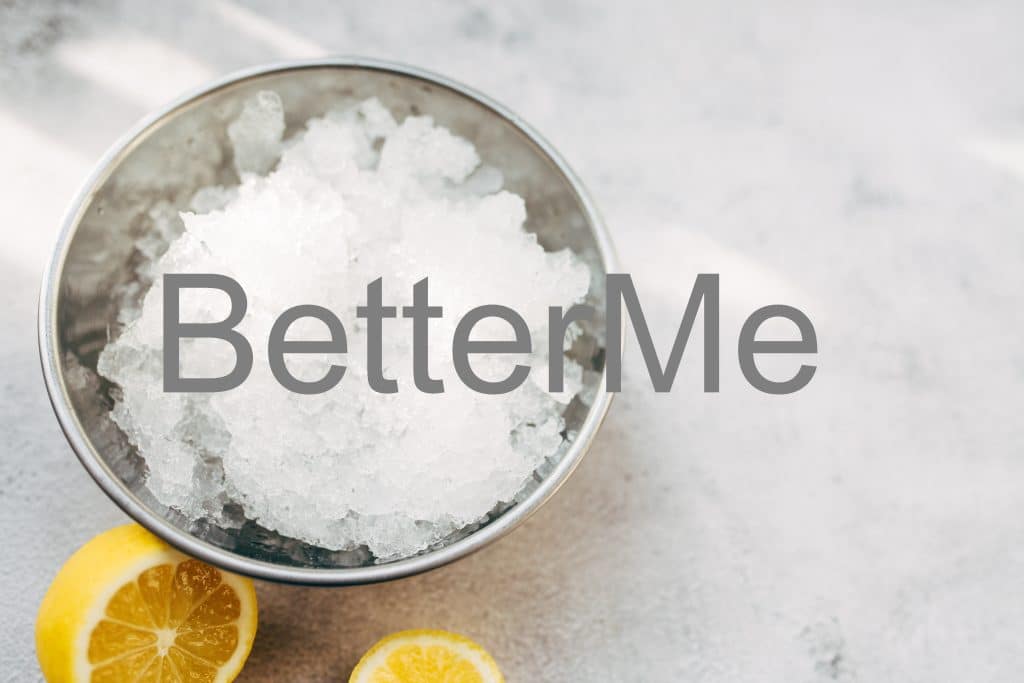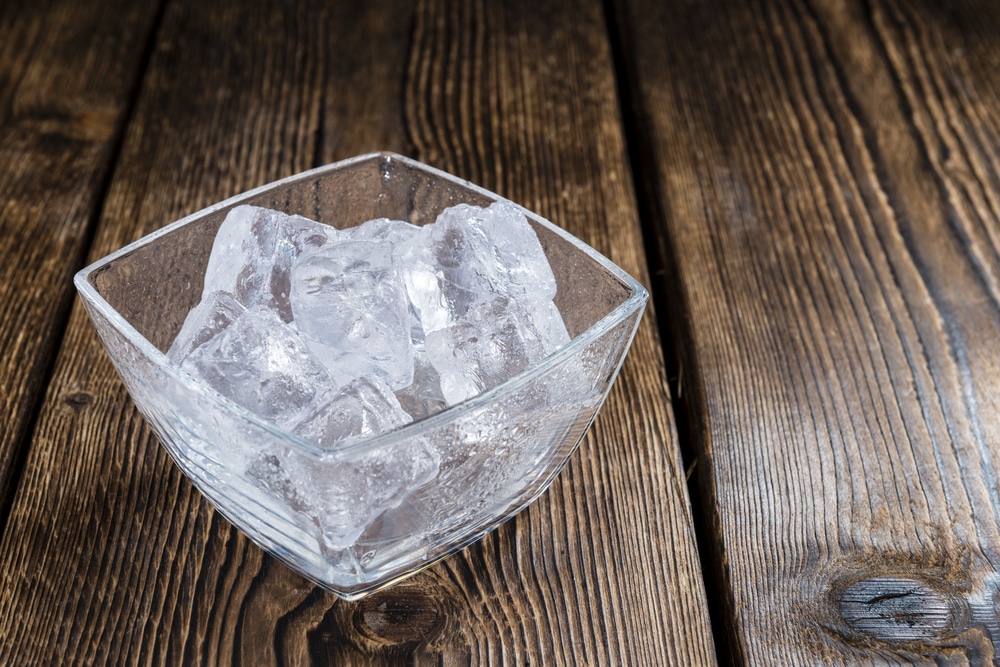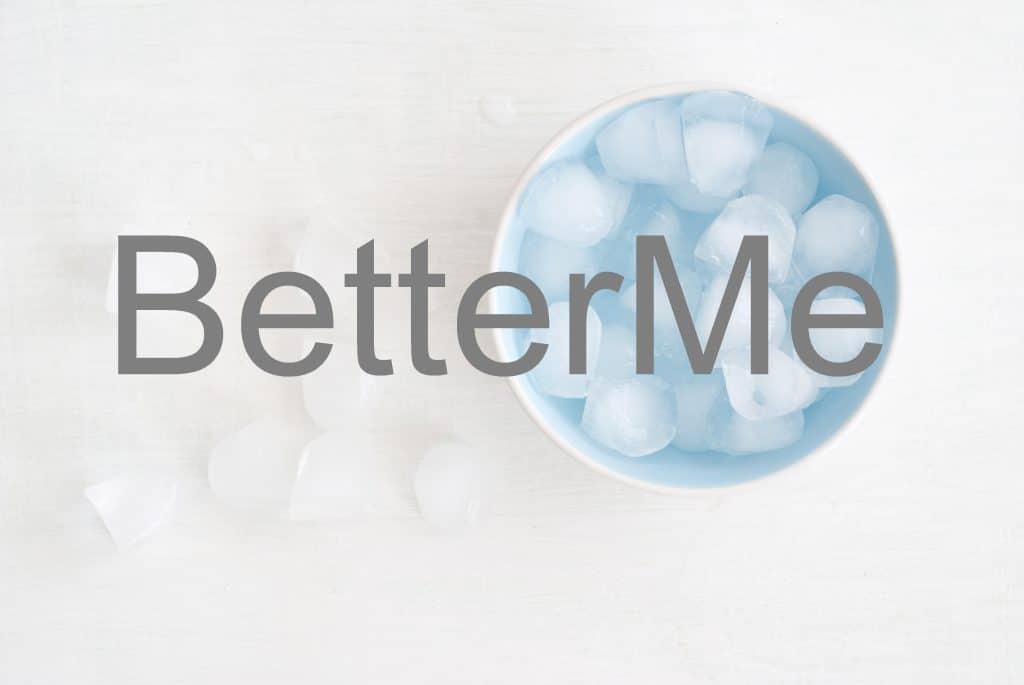Do you ever crave ice so much that you find yourself crunching on a handful of ice cubes as if it’s popcorn at a movie theater? It’s a peculiar habit, but one that some people indulge in from time to time. If you are one of these people, perhaps you want to know the health implications of this icy obsession. Is there any nutritional value in eating ice, or can it be harmful? Are there any benefits of eating ice? The truth is, while munching on ice may provide temporary relief from thirst or even serve as a zero-calorie ‘snack’, it is not without potential risks. The human body isn’t designed to regularly consume ice, and engaging in this behavior frequently can result in dental issues and possibly signal underlying health conditions. In this article, we’ll examine the pros and cons of eating ice, and help you decide if the fleeting satisfaction is worth the potential downsides.
Get your personalized
meal plan!
Why Am I Craving Ice?
The urge to chew ice, known as pagophagia, is often linked to a condition called pica, which is an eating disorder involving the consumption of items that are not typically considered food and have no significant nutritional value (10).
The most common forms of pica include the consumption of dirt, clay, and ice. In certain cases, people with this disorder may even consume objects such as paper and paint chips.
So, what makes some people feel the need to eat ice? The most common reasons for craving it include:
Iron Deficiency Anemia
One of the most common causes of pagophagia is iron deficiency anemia (4).
This is a condition where the body lacks sufficient iron for producing hemoglobin, a protein in red blood cells that enables them to carry oxygen around the body. If the brain doesn’t receive enough oxygen, this can lead to cravings for substances such as ice.
The exact link between iron deficiency anemia and pagophagia is not yet fully understood.
Some theories have suggested that chewing ice may increase alertness and mental clarity in individuals who have this condition by increasing blood flow to the brain (4). However, more research is required to confirm this.
Read More: Exploring the Nutritional Benefits of Eating Watermelon at Night
Nutritional Deficiencies
In addition to iron deficiency, other nutritional deficiencies can lead to pagophagia, including zinc and magnesium deficiencies. The body requires these nutrients for a variety of functions, and deficiencies can cause abnormal cravings, including the desire to chew ice (1).
Psychological Factors
Psychological factors, including stress, anxiety, and mental health disorders, can also contribute to pagophagia (9). Chewing ice can provide a temporary distraction or relief from them.
Some individuals may also develop this habit out of boredom or as a coping mechanism. There may also be an increased likelihood that people who have Obsessive Compulsive Disorder (OCD) will develop this habit (7).
Oral Health Issues
Some people may chew ice as a means of relieving discomfort that is caused by oral health issues, such as teething in children, gum inflammation, or xerostomia (dry mouth) (10). However, this habit can further damage the teeth and gums, which leads to a vicious cycle.
Eating Disorders
In certain cases, pagophagia can be an indicator of underlying eating disorders, including anorexia or bulimia (11).
These conditions can cause individuals to seek ways to control their body weight and urge them to substitute food with items containing fewer calories, such as ice. In such cases, individuals may feel compelled to chew ice and they can engage in this behavior for prolonged periods of time.

Whether you’re a workout beast or just a beginner making your first foray into the world of fitness and dieting – BetterMe has a lot to offer to both newbies and experts! Install the app and experience the versatility first-hand!
The Benefits Of Eating Ice
Although there is no nutritional value in eating ice, it does offer some key benefits. For example:
Might Enhance Mental Alertness
As previously mentioned, some people who suffer from iron deficiency anemia may find that chewing ice helps increase alertness. This is because increased blood flow to the brain can help improve cognitive performance (4).
However, it does nothing to address the underlying cause of the symptoms. It is essential to see a healthcare provider in order to be correctly diagnosed and treated for potential nutrient deficiencies.
Hydration
Chewing on ice may also help keep you hydrated. While drinking water is the best way to do this, sometimes ordinary water just doesn’t cut it. Chewing on ice may be an easy and convenient way to increase your water intake, particularly when you need to cool down or are temporarily unable to drink fluids for medical reasons.
Oral Satisfaction
Ice also provides oral satisfaction as a form of sensory stimulation. Many people find the texture of crunchy ice cubes to be soothing, and others may enjoy the feeling of having something hard in their mouths.
The Risks Of Eating Ice
Despite the short-term benefits, there are several risks that are associated with eating ice, including:
Tooth Damage
Ice is a hard substance that can wear down tooth enamel and lead to a number of issues, including cracks, chips, or even tooth loss. In addition, it can cause irritation and swelling of the gums, which may contribute to periodontal disease (8).
Nutritional Deficiencies
If you use ice as a meal replacement or are suffering from pagophagia, this can lead to or be a sign of nutritional deficiencies. This is because eating ice rather than nutritious food can deprive your body of essential vitamins, minerals, and nutrients.
Eating Disorders
As previously mentioned, using ice as a food substitute is problematic and is a potential sign of an eating disorder (11).
Choking Hazard
While it is uncommon, there is a risk of choking when chewing ice, particularly for children or people who have difficulty swallowing.
If you have difficulty swallowing, you should avoid eating ice altogether. In addition, if your child shows signs of pagophagia, a doctor should be consulted immediately.
Is It Ok To Eat Ice Daily?
That depends. Eating ice isn’t necessarily harmful for most people. However, if you experience intense cravings for it or eat it instead of food, this can lead to or be a sign of nutritional deficiencies or an eating disorder.
If you’re using it to stay hydrated or just out of boredom, you should try drinking water instead.
How Do I Stop Craving Ice?
If you find yourself craving ice excessively, this could be a sign of an underlying condition. The first step is to consult a healthcare provider who can identify the cause and offer treatment.
Depending on the reason for your cravings, they may prescribe medication, suggest dietary changes, or recommend therapy as a means of addressing a mental health condition.
The following lifestyle modifications may also help:
Address Underlying Nutritional Deficiencies
If your craving for ice is due to iron deficiency anemia or other nutritional deficiencies, addressing these deficiencies can help curb the craving. This can be done through dietary changes, including eating iron-rich foods such as spinach, red meat, and beans, or taking supplements as advised by a healthcare provider.
Consulting a healthcare provider is important before starting any supplement regimen, as they can provide personalized advice based on your specific needs and health status.
In addition to diet and supplements, regular check-ups are essential for monitoring your nutrient levels and adjusting your treatment plan as required.
If dietary changes and supplements don’t help, your healthcare provider may recommend other treatments, including intravenous iron therapy for severe iron deficiency.
Replace Ice With Healthier Alternatives
Another strategy to stop craving ice is replacing it with healthier alternatives. For example, you could try chewing sugar-free gum or munching on crunchy vegetables such as carrots or celery.
These alternatives can provide a similarly satisfying crunch without any risk of dental damage.
Drinking cold water or flavored water can also help satisfy your desire for something cold. If you find it difficult to quit by going cold turkey, you should talk to your healthcare provider so they can rule out any underlying deficiencies or other causes.
Practice Mindful Eating
Mindful eating involves focusing on your eating habits, recognizing your triggers for unhealthy cravings, and learning how to manage them.
You may find that you crave ice more when you’re bored, stressed, or anxious. By identifying these triggers, you can take steps to address them, including finding healthier ways of coping with stress or engaging in activities that keep you occupied.
Mindful eating also encourages you to slow down and enjoy your food, which can make you feel more satisfied and less likely to reach for ice. This can involve focusing on the texture and flavor of your food, eating in a distraction-free environment, or taking time to savor every bite.
Find Healthy Outlets For Stress
You should find healthy outlets for stress, such as exercise, meditation, or deep breathing. Regular physical activity can help reduce stress and improve overall mental well-being. Other activities that can help relieve stress include yoga, journaling, or talking with friends.
Dropping pounds by the dozens without putting yourself through the wringer is everyone’s weight loss pipe dream. But what if we told you that the BetterMe app can make that happen? Keep yourself in prime shape with our fat-blasting workouts, delicious budget-sparing recipes, and body-transforming challenges with our app!
Seek Professional Help
If your craving for ice is intense and persistent, or if it is accompanied by other concerning symptoms, it is a good idea to seek professional help. A healthcare provider can help identify any underlying medical conditions that cause your cravings.
A mental health professional, such as a psychologist or psychiatrist, is also beneficial if cravings are linked to emotional or psychological factors.
Cognitive-behavioral therapy (CBT) is a type of therapy that has proven to be particularly effective for the management of cravings and changing unhealthy eating habits (3).
Frequently Asked Questions
What Are The Benefits Of Crushed Ice?
Crushed ice can provide temporary relief from dry mouth, soothe a sore throat, and help cool you down on a hot day. It can also be used in a therapeutic setting, such as reducing swelling or inflammation following an injury (5).
Can I Eat Ice Every Day?
While eating ice every day is not necessarily harmful if it isn’t caused by an underlying deficiency, eating disorder, or other condition, it can potentially result in dental damage that can include worn tooth enamel, sensitivity, or cracked teeth (8). Regular consumption may also indicate underlying health issues such as iron deficiency anemia. Therefore, it’s best not to make a habit of eating ice and if you do, you should seek advice from a healthcare professional.
Is Ice Good For The Skin?
Applying ice to the skin can help reduce redness and puffiness, soothe inflamed acne, and tighten the pores (6). However, this should be done carefully and ice should not be applied directly to the skin to avoid frostbite.
Is It Good Or Bad To Eat Ice?
Eating ice occasionally or in small amounts isn’t necessarily bad. However, regular consumption of it, particularly in large quantities, can cause dental problems. It may also indicate certain underlying health issues if cravings are intense and persistent.
What Is The Benefit Of Chewing Ice?
Chewing ice can provide temporary relief from dry mouth through the stimulation of saliva production. It can also help lower your body temperature on a hot day. However, regular ice chewing can result in dental damage and jaw pain.
Does Eating Ice Hydrate You?
Yes, eating ice will hydrate you because ice is basically water in solid form. However, it is less effective than drinking water as the amount of water you get from chewing ice is relatively small. Drinking water is the most efficient way to ensure you remain hydrated.
The Bottom Line
Chewing ice can provide some short-term benefits, such as hydration and mental alertness. However, it can also cause or be a sign of several long-term problems, such as tooth damage, digestive issues, nutritional deficiencies, and eating disorders.
If you find yourself relying on ice to satisfy cravings or you use it as a meal replacement, you should consult your doctor. They can evaluate any underlying medical conditions that could potentially cause your cravings and provide you with appropriate treatment.
In some cases, simply reducing stress levels and focusing on eating nutritious foods may help reduce the urge to consume ice. For example, adding iron-rich foods to your diet can help decrease the desire for pagophagia if you suffer from iron deficiency anemia.
Staying hydrated and practicing healthy oral hygiene habits are also essential.
DISCLAIMER:
This article is intended for general informational purposes only and does not serve to address individual circumstances. It is not a substitute for professional advice or help and should not be relied on for making any kind of decision-making. Any action taken as a direct or indirect result of the information in this article is entirely at your own risk and is your sole responsibility.
BetterMe, its content staff, and its medical advisors accept no responsibility for inaccuracies, errors, misstatements, inconsistencies, or omissions and specifically disclaim any liability, loss or risk, personal, professional or otherwise, which may be incurred as a consequence, directly or indirectly, of the use and/or application of any content.
You should always seek the advice of your physician or other qualified health provider with any questions you may have regarding a medical condition or your specific situation. Never disregard professional medical advice or delay seeking it because of BetterMe content. If you suspect or think you may have a medical emergency, call your doctor.
SOURCES:
- A meta-analysis of pica and micronutrient status (2014, nih.gov)
- A Retrospective Literature Review of Eating Disorder Research (1990–2021): Application of Bibliometrics and Topical Trends (2022, mdpi.com)
- Brief Cognitive-Behavioral Therapy (n.d., nih.gov)
- Craving and chewing ice: A sign of anemia? (2022, mayoclinic.org)
- Effects of Topical Icing on Inflammation, Angiogenesis, Revascularization, and Myofiber Regeneration in Skeletal Muscle Following Contusion Injury (2017, nih.gov)
- Facial Icing: Is Ice Good for Your Face? (2021, clevelandclinic.org)
- Insight in obsessive compulsive disorder: Concordance amongst various measurements (2014, nih.gov)
- Is It Bad for You to Eat Ice (2023, tsmp.com.au)
- Pagophagia in a Female with Recurrent Depressive Disorder:A Case Report with Review of Literature (2018, nih.gov)
- Pagophagia – A Common but Rarely Reported Form of Pica (2014, nih.gov)
- What is Pagophagia? (2023, wemd.com)











